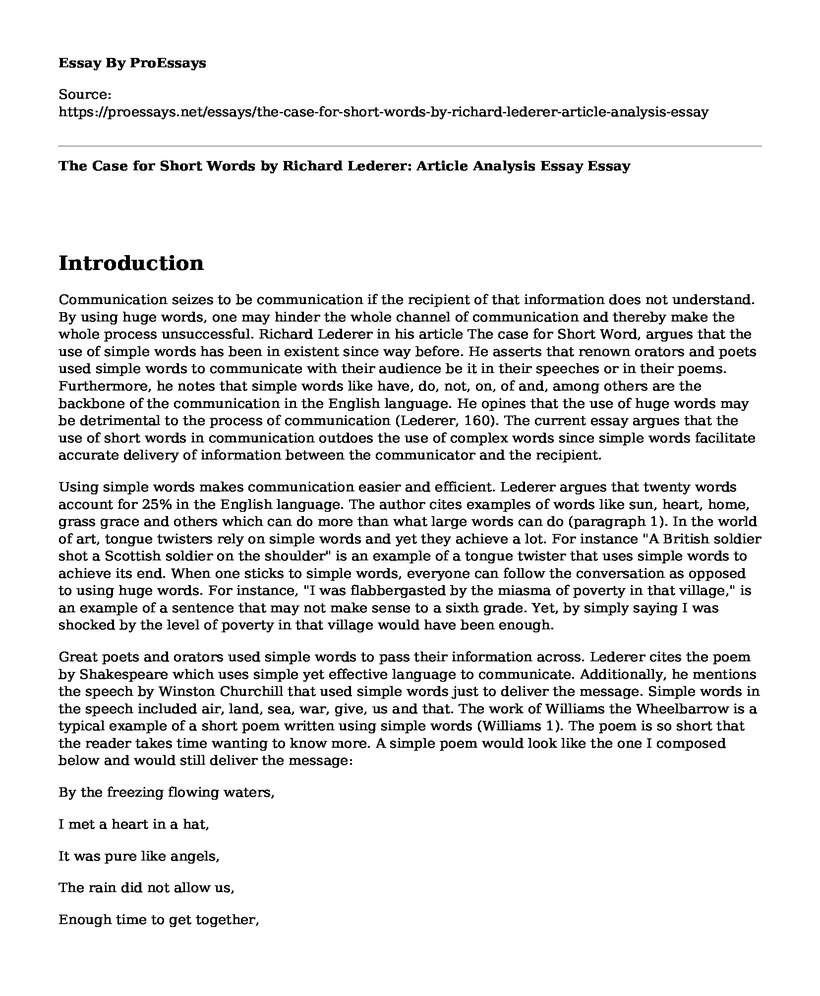Introduction
Communication seizes to be communication if the recipient of that information does not understand. By using huge words, one may hinder the whole channel of communication and thereby make the whole process unsuccessful. Richard Lederer in his article The case for Short Word, argues that the use of simple words has been in existent since way before. He asserts that renown orators and poets used simple words to communicate with their audience be it in their speeches or in their poems. Furthermore, he notes that simple words like have, do, not, on, of and, among others are the backbone of the communication in the English language. He opines that the use of huge words may be detrimental to the process of communication (Lederer, 160). The current essay argues that the use of short words in communication outdoes the use of complex words since simple words facilitate accurate delivery of information between the communicator and the recipient.
Using simple words makes communication easier and efficient. Lederer argues that twenty words account for 25% in the English language. The author cites examples of words like sun, heart, home, grass grace and others which can do more than what large words can do (paragraph 1). In the world of art, tongue twisters rely on simple words and yet they achieve a lot. For instance "A British soldier shot a Scottish soldier on the shoulder" is an example of a tongue twister that uses simple words to achieve its end. When one sticks to simple words, everyone can follow the conversation as opposed to using huge words. For instance, "I was flabbergasted by the miasma of poverty in that village," is an example of a sentence that may not make sense to a sixth grade. Yet, by simply saying I was shocked by the level of poverty in that village would have been enough.
Great poets and orators used simple words to pass their information across. Lederer cites the poem by Shakespeare which uses simple yet effective language to communicate. Additionally, he mentions the speech by Winston Churchill that used simple words just to deliver the message. Simple words in the speech included air, land, sea, war, give, us and that. The work of Williams the Wheelbarrow is a typical example of a short poem written using simple words (Williams 1). The poem is so short that the reader takes time wanting to know more. A simple poem would look like the one I composed below and would still deliver the message:
By the freezing flowing waters,
I met a heart in a hat,
It was pure like angels,
The rain did not allow us,
Enough time to get together,
We went our different ways,
Never to meet again,
I wish that heart does not hurt.
The use of simple words made poems and speeches like those of Winston and Williams to remain in the hearts of their audience. The reason is, they were easy to read, understand, and interpret. Thus, they left a lasting effect which makes them relevant centuries after they were composed.
When orators and authors choose to use huge words, they create a communication barrier between them and their audience. In paragraph 2, Lederer observes that "Big words can make the way dark for those who read what you write and hear what you say." Thus, the author advocate for the use of selected simple words to enhance communication. By giving examples of works written by his students in ninth grade, the article makes it clear that the use of monosyllables in communication makes the whole big differences. The essays are simple, clear and easy to read and interpret. Some sentences may contain professional jargon that is only relevant to people in a certain field. Such words should be avoided at all costs as they may distort the information. A typical sentence could read: the locomotion of huge terrestrial organism is influenced by hydrological requirements. Such a sentence has pure jargon and may be inappropriate for people in that field. Yet, simply what the person is saying is that the movement of land animals is influenced by the need for water. Using such words may cause the information not to reach the intended user accordingly
Conclusion
The use of short words in communication outdoes the use of complex words since simple words facilitate accurate delivery of information between the communicator and the recipient. Over the years, the great orators, and poets who used simple words still remain relevant today and people remember them more. There are many words in the English language yet only twenty of them constitute 25% of the total words. Using simple words makes the communication between the authors and readers or the orators and the listeners efficient. When huge words come into play, they may affect the communication channel leading to a total breakdown in communication.
Work Cited
Lederer, Richard. "The Case for Short Words." Short Essays for Composition (2017): 160.
Williams, William Carlos. The red wheelbarrow. Poetry on the Buses, Chatham College, 1981.
Cite this page
The Case for Short Words by Richard Lederer: Article Analysis Essay. (2022, Apr 11). Retrieved from https://proessays.net/essays/the-case-for-short-words-by-richard-lederer-article-analysis-essay
If you are the original author of this essay and no longer wish to have it published on the ProEssays website, please click below to request its removal:
- Asset-Based Model of Community Service Paper Example
- The Benefits of Empowering Women to Society Essay Example
- Military Personnel Make Great Assets in the Business World Essay Example
- Essay Example on Latina Women in Media: Invisibility & Stereotyping
- Essay Example on Racial Disparities in Diabetes Prevention & Care: Double the Risk for Hispanics & African-Americans
- Essay on Social Comparison Orientation & Group Membership: Effects on Similarity-Attraction
- Essay Example on Jamaica's National Motto: Out of Many, One People







